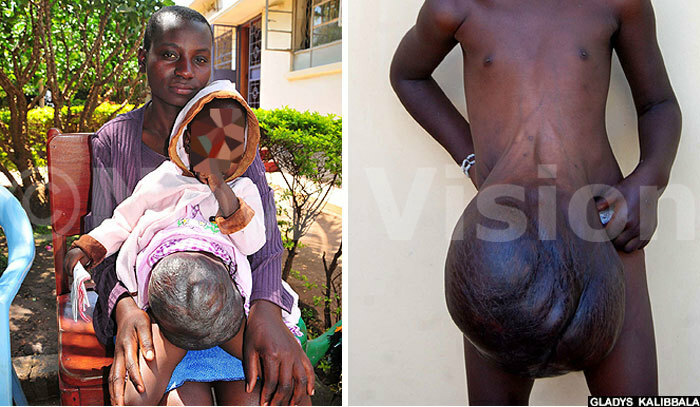'I went home to wait for my baby's death'
Monica’s early experience with her first child is another tale of its own. A telling one.
At 20, Monica Kiiza was expecting her first child with her husband, Hussein Senkambwe.
They both lived in Biwanga village, Mubende district.
Monica had dropped out of school in Primary Seven and all she wanted was to settle down with her husband and make a happy family. She did not know her father until later in her life, and after living him with him for a few years, he died.
Because of the absence of parental figures in her early life, Monica was determined to settle early so that her children do not miss any parental love and care.
But such resolve came crashing on her when Senkambwe abandoned her at a time when their first born was a year old and Monica in the first month of her second pregnancy.
Monica's early experience with her first child is another tale of its own. A telling one.
A few weeks to her delivery day, she went for a scan which revealed "some issues" with her baby and so doctors at Mubende Hospital advised her to prepare for a Caesarean birth.
But Monica did not show up on the night of the operation. In fact, she instead went to dig in her garden the following morning.
"Around midday, labour pains started and I rushed to Mubende hospital where I had normal delivery of a baby girl," she says.
But something was not right, and the look splashed all over the midwife's face told it all.
"When she [newborn baby] was handed to me, I saw all her intestines only covered with a transparent membrane which prevented them from falling out," Monica says, her eyes welled with tears.
As a young inexperienced mother, the situation injected fear in Monica. In the same health facility, a chat with another young woman there worsened her fears. She had also given birth to a baby with such a condition and her baby did not live for long.
For her case, doctors covered the transparent part with cotton wool as they prepared her and the baby for transfer to Mulago Hospital in Kampala for an operation.

On arrival at the national referral facility, removing the cotton wool tore the transparent membrane, forcing the intestines out. She told Monica how her baby would go on to die before the operation.
Resigned to the inevitable
As if that story was not enough, the following day, one of the nurses at Mubende Hospital behaved indifferently to Monica.
"She did not immunize my baby, saying it was better to save it [vaccine] for normal babies as mine had only a few days to live."
Meanwhile, because doctors had warned Monica about how a lot of care must be taken to avoid infection towards her baby, she wrapped the child in two bedsheets up to her head. "I later sneaked out of the hospital with my baby and went home to wait for her death."
As she waited for her child to breathe her last, Monica still kept her warm and would change bedsheets frequently. Also, she kept her indoors and did not show her to visitors.
The young mother feared to tamper with the delicate part of the baby's stomach, so she would lay next to the baby and breastfed her without moving her. A week later she took the baby back to hospital and was advised to go to Mulago as the doctors in Mubende had no solution to the child's condition.
"We were surviving on digging and my husband had no money for me to go to Mulago so I took the baby back home."
Monica continued to wrap the baby in bedsheets and did not give her a dress until she turned three months. As weeks passed, a harder skin started growing around the baby's stomach and by the first month, the new skin had covered the whole area, but left a protrusion.
It is this part that started swelling outwards and later pulled the little girl's tummy out.
Trip to Mulago
Monica and Senkambwe took the baby to Mulago Hospital when she turned three months, and she was admitted at Ward 15 in Old Mulago for some weeks.
The visits to Mulago continued for reviews and her husband always accompanied her.

Monica is pictured here with her daughter. Doctors are still studying her case and hope that one day they can operate on her
One day after spending two days with their daughter at Mulago, Senkambwe asked her to sit somewhere around the bus park in Kampala, saying he was going to get them something to eat.
He never returned.
"I slept at the bus park that night with my sick daughter as he never came back," she recalls, tears rolling down her cheeks. It was desperate times as Monica did not have any money to transport them back home. Luckily, one bus company offered to take them for free the following morning.
So what happened to the father of Monica's children (remember at this point, she was having her second pregnancy)?
When Monica returned home, she learnt that when Senkambwe abandoned them at the bus park the previous day, he rushed back home, sold three acres of their land and took all his belongings, leaving only Monica's clothes in the house.
The desperate young mother turned to her mother-in-law but that channel was not helpful. She was cold to Monica, assuring her that her family does not produce such children. With no-one to turn to, she decided the return home in Kitende village, Kyegegwa district.
Since then, Monica has concentrated on digging to enable her take care of her now two children. But it is peanuts, unable o sustain her young but demanding family.
The doctors at Mulago Hospital are still studying her first child's case and are hopeful that she may be operated on one day. "I have learnt to cope with the assistance from good Samaritans and continue to take my daughter for reviews every month," say Monica who rents a two-roomed house.
(For any assistance to Monica and her child, feel free to contact the writer of this story who is in direct contact with her. Gladys' email address is gkalibbala2@gmail.com or phone: 0713811445/ 0782811445)
COMMENTS FROM EXPERTS

Tabitha Suubi, program officer at Raising Voices:
Both mother and father have the primary responsibility of taking care of their child or children. For a father to shun away from taking care of their child because they fear they will spend too much on the child's health is unrealistic. It is an act of violence against children as well as child neglect.
Monica's case is one of the many cases that we receive at Raising Voices. Several mothers that have come to our offices to seek help allege that their partners have abandoned them with their children. Such mothers suffer chronic failure to meet children's needs by themselves, that is, provision of adequate food, clothing, shelter, medical care and basic education requirements.
As Raising Voices, we advocate on behalf of these children and work towards the prevention of all forms of violence against children in Uganda.We strongly encourage parents to plan and take care of the children that we bring into the world because as parents if we don't, who else should do it for us?
*****************

Dr Mathias Luwemba, formerly Kisubi Hospital:
The condition of Monica Kiiza's child is known as Exomphalos (a.k.a omphalocele), which is one of the types of abdominal wall defects.
An abdominal wall defect is where a baby's abdomen does not develop fully while in the womb. With exomphalos, a baby's abdomen fails to close around the base of the umbilical cord. This means that some organs develop outside the abdomen. It is usually just the intestine that is outside the abdomen, but sometimes the liver and other organs can also develop outside the baby's abdomen. The organs outside the abdomen are contained within a sac which is usually covered in a protective membrane, so it is like a balloon at the base of the umbilical cord.
How does it happen?
While a baby is going through early stages of development, the intestines grow faster than the abdominal cavity; they elongate in the umbilical sac, which remains open through the first three months of gestation. Toward the end of the first trimester, the intestines normally return into the abdominal cavity and the sac closes, becoming the umbilical cord. In exomphalos, the sac does not close completely, resulting in protrusion of part of the liver or intestines into the open sac.
Cause and Incidence: The cause of this condition is unknown but it is reportedly hereditary in some families. It is quite a rare problem. More boys than girls are affected.
Treatment
Surgical treatment - All babies with exomphalos will at one point in time need an operation after they are born, depending on the size of the exomphalos as well as whether the baby has other disorders.
Survival
Survival depends on whether the baby just has an exomphalos or also has other disorders.
• If the baby just has an exomphalos there is a 90% (9 in 10) chance of surviving. The chances of survival are lower if the exomphalos is very large.
• If the baby has other disorders, they may only have a 10% (1 in 10) chance of surviving. The chances of survival depend on how serious the other disorders are.